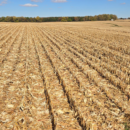FNC News
Tangible vs. Intangible: Comparing Land Investments to the Stock Market
“I’ll wait to buy when there is a dip in the market.” “It can’t keep going up forever.” “The bubble will eventually burst.”
If you’ve spent much time in your local coffee shop, you have probably overheard conversations like these. Whether discussing stock prices or land values, many investors believe in waiting for the perfect moment to buy. However, when it comes to long-term investments, I believe time in the market is a better tool than timing the market.
Over the past two years, I’ve had countless conversations with landowners wondering whether it’s the right time to buy or sell. Some have considered alternative investments like certificates of deposit (CDs) or mutual funds as a place to park their capital. When comparing these options, I find it helpful to put them on equal footing by drawing parallels between land and stocks.
A Simple Comparison: Land vs. Stocks
One of the easiest ways to compare land to stocks or mutual funds is by looking at their fundamental similarities:
Shares of stock = Acres of land
Stock price per share = Land price per acre (A rise or fall in either represents an unrealized gain or loss.)
Stock dividends = Farm income from cash rent or leases (Both provide realized gains.)
Mutual fund fees = Landownership costs (Taxes, repairs, and improvements function similarly to investment fees.)
By viewing land and stocks through this lens, we can compare appreciation, annual return on investment (ROI), and costs, helping you make an informed decision about which investment vehicle is best for you.
Investment Appreciation
Just as no two stocks are the same, no two pieces of land appreciate at the same rate. However, historical trends offer valuable insight.
In Nebraska, farmland has appreciated at an average annual rate of 8.97% since 2004. Over the same 20-year period, the Dow Jones Industrial Average grew at 8.77% annually, while the S&P 500 averaged 12.42%. However, annual fluctuations varied:
- Nebraska farmland ranged from -4.3% to +31.52%
- The Dow Jones ranged from -33.84% to +26.5%
- The S&P 500 ranged from -37% to +32.39%
While land values generally trend upward, they tend to be less volatile than the stock market, making land an attractive long-term investment.
Return on Investment (ROI)
ROI varies depending on location, land use, and management, just as different stocks and mutual funds offer varying dividend yields. Farmland in the Midwest has historically generated returns between 2% and 6%, while the average dividend yield for Dow Jones and S&P 500 ETFs ranges from 0.5% to 1.5%.
One key advantage of farmland is that you have some control over your ROI, unlike stocks, where returns are dictated by the market. Through improvements, better land use strategies, and lease agreements, you can actively enhance your land’s profitability.
Cost of Ownership
While land typically has a higher entry cost, it offers unique advantages:
- It’s a tangible asset. Unlike stocks, you physically own and control land.
- It’s a finite resource. US farmland acres are decreasing which helps to increase its long-term value.
- It encourages long-term holding. Unlike stocks, where it is easy to sell on impulse, land ownership naturally fosters a long-term mindset.
Of course, land ownership comes with expenses such as property taxes, maintenance, and improvement costs. However, you have control over many of these costs, and certain improvements can enhance your return.
If purchasing land outright isn’t feasible, there are alternative ways to invest, such as land funds and Real Estate Investment Trusts (REITs), which offer exposure to land appreciation without the high initial cost.
Management: A Key to Success
Just as a financial advisor manages stock investments, landowners can employ professional farm managers to maximize returns. At Farmers National Company, our local farm managers provide expert guidance to ensure your land is well-maintained and profitable.
If you’re considering a land purchase or looking for ways to enhance your farmland’s productivity, we are here to help. Give your local Farmers National Company representative a call to discuss options and strategies.
Land ownership offers control over a tangible, limited resource that can appreciate over time, generate income, and even serve as loan collateral. It can also provide tax advantages in certain cases. With multiple uses, including farming, leasing, and development, land remains a valuable financial tool.
As the famous saying goes: “Don’t wait to buy land. Buy land and wait.” -Will Rogers
More News




